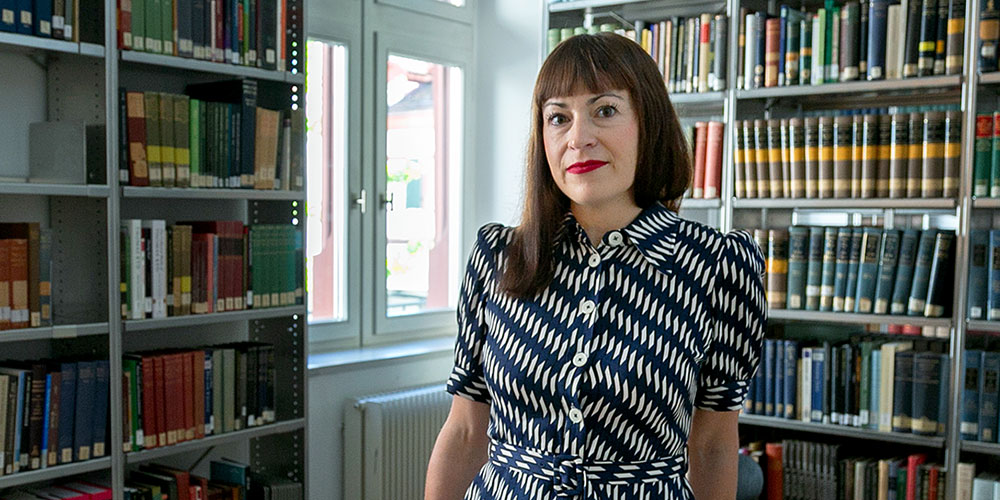“We need new myths that make us want to participate”
Why are more and more people in Western democracies yearning for destruction? And why do they vote for parties that promise just that? Literary sociologist Carolin Amlinger unpacks the roots of the global rightward shift and reveals why even Switzerland isn’t immune.
13 October 2025 | Noëmi Kern
Dr. Amlinger, your new book is called Zerstörungslust, the desire to destroy. That doesn’t sound very hopeful. What did you investigate?
My co-author Oliver Nachtwey and I wanted to understand why right-wing parties are on the rise in many Western societies. In the EU alone, right-wing parties are currently in government in seven countries. We therefore focused on the question of what lies behind the crisis of established democracies. How can it be that so many people who have been democratically socialized and enjoy considerable freedoms are now enthusiastically rejecting these very freedoms and with them the principles of democratic participation? We empirically explored this desire to destroy central institutions of liberal democracy.
How did you proceed?
First of all, we conducted a survey with 2,600 participants in Germany using statements such as “I want our society to be utterly obliterated,” “There may be reasons that justify violent behavior” or “When I think of social or political institutions, I can’t help but think that they should be destroyed.” Respondents were able to agree or disagree with these statements on a scale. This survey revealed that 12.5 percent of respondents are destructive, i.e. had medium or high agreement ratings. It doesn’t sound like much at first, but that’s more than one in ten people. These people tended to be young, male and politically right-wing.
What is behind this destructiveness?
We wanted to better understand the deeper emotional story behind this 12.5 percent. After all, politics takes place in everyday life.
That’s why we conducted 41 additional interviews. We first inquired about their formation of political opinions and their trust in political and social institutions, before expanding to their social history, their biography and their family background.
Can you summarize the results?
The motives and social conditions for destructive attitudes vary greatly. Looking at their social and biographical histories, it is striking that many people have experienced multiple social disruptions or personal misfortunes. This gives rise to the feeling that society can no longer keep its own promises—namely, the promise of a decent life that can be achieved through social mobility. We have encountered this time and again across different professions.
Can you give some examples?
Some have invested a great deal in their own education. But the promise of advancement through education did not materialize for them, or only to a limited extent. Some entrepreneurs and self-employed people felt increasingly constrained by growing bureaucracy and limited in their economic productivity by diversity programs or climate protection regulations, for example. Many also reported that public infrastructure no longer works, local transport is permanently delayed, the parks are not maintained and the roads are full of potholes, and so on. And, in the same breath, many reported the visible presence of “different lives” in public spaces, such as refugees or non-binary people.
Taken together, all of this was evidence for the interviewees that “everything in their own lives is getting worse.” The feeling that everything around them is falling apart leads to a generalized perception that society is becoming increasingly closed and no longer stands for greater opportunity.
And the “different” people are to blame for this?
No, in reality of course not. But the feeling of social decline results in a form of zero-sum thinking: the gains of one group mean a direct loss for the other. In this case, social wealth is like a pie you can divide up. The more other people want to eat, the less there is left for me. The interviewees repeatedly mentioned the growing number of migrants, the increasing integration of social minorities, and the employment of women, which is perceived as a threat by men. A false causal relationship was then established: the deterioration of my life goes hand in hand with the improvement of other lives. We wanted to get to the bottom of this perceived notion and take people seriously in their life stories in order to understand them. But understanding does not mean forgiveness. We wanted to uncover the rationale behind what appears to be irrational behavior, in order to analyze the causes of the current shift to the right in established democracies.
Where do these causes lie?
In recent years, for example, many liberal governments have pursued policies on the basis of practical constraints: there is no money, so local authorities have to cut budgets and can no longer invest in schools, public swimming pools, or infrastructure. On the other hand, there was money to bail out banks or for military upgrades. This does not necessarily lead to a strengthening of trust in the state and its government – quite the opposite. Mistrust of the state has increased enormously and is also a result of politics.
And people’s hope is that new forces can change that?
Minorities and majorities were brought up in many interviews. There is a feeling that the majority is not being heard and that people are suffering under the tyranny of the minority. The interviewees hope that the far right will pursue policies based on the primacy of the majority.
We usually associate democracy with electoral democracy and a parliament. Today’s right wing understands democracy more as a community based on ancestry, in which all others are removed or dominated. They see themselves as representatives of the “will of the people.” To enforce this, they may also resort to authoritarian means. Both historical fascism and contemporary fascism alike assume that the election of parliament, endless debate, and the search for consensus are not suitable for solving modern social problems.
You also write about the polycrisis: climate change, digitalization, migration, gender diversity – these are many complex issues. Are people simply longing for guidance?
I wouldn't call it guidance. It’s more a desire to maintain sovereignty in the face of social developments that people feel powerless to influence. The feeling of being blocked, of not moving forward, individually or socially, leads to simply wanting to clear away all the obstacles that stand in your way. This is the socio-emotional core of the “destructive desire” that seeks to de-liberalize democracy from within. In this sense, destructiveness provides guidance because you “clean up” or the “strong man” does it on your behalf. In the US, for example, three-quarters of Republican voters are in favor of dictatorial measures to get the state “back on track.”
The book focuses on Germany and the US. What is your assessment of the situation in Switzerland?
In Switzerland, the SVP recently polled at 30 percent in the election barometer, an unprecedented high. Although the SVP has absorbed the right-wing forces within itself, preventing the formation of a new far-right party, it has become more right-wing as a result. In this respect, Switzerland is no exception among Western democracies. At the same time, however, there are major differences. Those surveyed perceived Switzerland as a country where the “world is still in order.” This is not because there is any less inequality here. Switzerland is, if you like, a stable, unequal society, but one that gives its citizens a sense of unmediated participation through direct democracy.
Could the political climate change here too?
Given the high polling figures for the SVP, it cannot be completely ruled out. This is why it’s important to prevent a right-wing worldview from being normalized, such as the feeling of being overrun by those who are different.
The SVP is heavily exploiting this resentment with its “border protection initiative.” However, parts of the conservative and bourgeois center in Switzerland have also taken up the issue. In neighboring countries, we have seen that the conservative parties do not win back votes from the right by focusing on right-wing issues; on the contrary, this ultimately strengthens the right because this gives their stances legitimacy.
How can this destructive desire be dealt with constructively?
Fascism thrives not on arguments, but on myths. We need new myths that make us want to participate, not least because the myths of liberalism have exhausted themselves. Progress and advancement, with their idea of expansive growth, no longer work in the face of climate change. But what can we offer in their place, including as a new vision of coexistence? I believe we need to start thinking about that.
Where do you see reason for hope?
In our survey, over 60 percent were not destructive, so there are still anti-fascist majorities. This needs to be emphasized and used as a starting point: the majority of the population wants to live in a democratic society.
Carolin Amlinger and Oliver Nachtwey to receive the 2025 Geschwister Scholl Prize
Carolin Amlinger, a literary scholar, and Oliver Nachtwey, a sociologist, both from the University of Basel, will be awarded the 2025 Geschwister Scholl Prize. The jury is honoring their jointly authored book, Zerstörungslust: Elemente des demokratischen Faschismus, for its outstanding contribution to the analysis of current social and political developments.



